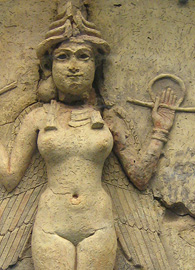Jeremiah Week 2
Being a Prophet is Hard, but Being an Idolater is Easy
Professor of Theology, Loyola University Maryland
Read this week’s Scripture: Jeremiah 2:1–6:30
11:54

 Enlarge
Enlarge
As we move through this section of Jeremiah, it is important to recognize how easy it is to lapse into idolatry. In biblical times, many relatively common activities, such as trade, marriage, and political negotiations, required sacrifices. Avoiding idolatry required vigorous attentiveness to how one carried oneself in the world. If we forget this, it will be very easy to dismiss the people of Judah as foolish and irredeemably corrupt. More importantly, we will miss the opportunity to see ourselves in them. We will blunt our abilities to see how often our careers, for example, become the single greatest focus of our time and attention. We will neglect the ways in which we sacrifice our children to our own frustrated hopes and dreams.
In this section, we get our first glimpse of the demanding life of a prophet. Being a prophet is a vocation, but it is also a calling to walk a long, lonely road.
Words from the Lord
This passage from Jeremiah contains a variety of words from the LORD which Jeremiah delivers. They are recorded in a poetic style that is not always easy to follow. For those more familiar with the narrative portions of Scripture, this type of text invites us to slow down and reflect on the images we find here. Again, unlike the narrative parts of Jeremiah, the connections between these discrete images are not always linear.
The first word from the LORD is directed to Jerusalem and is quite brief. The LORD recalls the devotion (chesed) of Israel in the wilderness. The images in these verses are of a loving couple on their honeymoon, Israel devoted to the LORD, and the LORD protecting Israel from all threats (Jeremiah 2:1–3). Much of the rest of this chapter consists of a set of charges lodged by the LORD against Israel. In that light, 2:1–3 provides a backdrop against which these charges take shape. These verses may reflect an idealized view of Israel’s devotion. Even if this is so, a more “realistic” perspective of Israel’s life with the LORD in the wilderness can hardly serve to justify her later wandering further from the LORD. The idealized account here is charitable and serves to sharpen the LORD’s dismay at her subsequent disobedience.
By the time one reaches Jeremiah 2:4, there is another word from the LORD. This is much more extensive and is cast in the form of the LORD’s indictment of Israel. It begins with rhetorical questions, inferring that Israel found no cause to abandon the LORD. Nevertheless, they have done so. Indeed, from the LORD’s perspective, Israel committed a two-fold sin: abandoning the LORD and joining themselves to other gods. The first is an act of betrayal; the second, pure folly. Both of these accounts play a role in Jeremiah’s discussion of Judah’s idolatry.
Judah’s Betrayal and Folly
In Jeremiah 2:26–28, the LORD castigates Judah for calling a piece of wood, “my father,” and saying to a chunk of stone, “You gave birth to me.” These are examples of the foolishness of treating inanimate objects as if they were God, as if they had saving power. The Judeans themselves seem to recognize this. As soon as they are in real trouble and need actual deliverance, they cry out to the LORD, “Save us!” (Jeremiah 2:27)
For long passages in chapters 2 and 3, the LORD relies on images of marital betrayal to describe Judah’s idolatry. Judah is persistently portrayed as a wanton woman, eagerly seeking lovers wherever she might find them. In the light of this way of portraying Judah’s life with God, several themes emerge. First, Judah does not appear to recognize her behavior in terms of betrayal in the way the LORD does (Jeremiah 2:23). Judah fundamentally misperceives her own behavior. This may strike modern ears as willful self-delusion. When one recognizes, however, how many aspects of life in this ancient world were tied up with the worship of gods, Judah’s disposition may be easier to understand, if not to excuse.
Think of the world of commerce: all transactions and contracts at this time required sacrifices. Abandoning these would have put the commercial interests of the rich in jeopardy. Judah faced a significant military threat in Babylon to the north. It made political sense to form alliances with Egypt to the south in order to secure Judah’s borders (Jeremiah 2:36). These treaties would also have required sacrifices. The alternative seems to have been to leave Judah’s political fortunes in the hands of the LORD. Commerce and politics comprise large elements of the life of most elite groups in a population. If the path to success in these areas required some minor sacrifices to other gods, it may have seemed a small price to pay for growth and security. Attitudes such as these must lie behind Judah’s claim of innocence in the face of the LORD’s accusations. This situation is made even worse by the ascendance of officials, priests, and prophets who all proclaim a message of peace. These leaders who should have most clearly seen and perceived Israel’s true state before God have misled the people, arguing that God would never let the Temple be destroyed, that at the end of the day it did not serve God’s own interests to judge Israel (Jeremiah 4:9–10; 5:12–13).
A second theme is that Judah’s behavior dismays the LORD. The LORD finds Judah’s idolatry baffling and disappointing; they gained nothing they did not already have — and better — from the LORD. They provoked punishment from the LORD; their alliances would prove worthless. Judah’s idolatry did not simply reflect the folly of ascribing divine worth and capacities to mere human creations; it reflected the folly of abandoning their one true source of life and security, their one true love. Even after witnessing Israel’s destruction for the same activities, Judah persists in her folly (Jeremiah 3:6–11).
Another theme is that although Jeremiah proclaims the LORD’s justified judgment and punishment of Judah, the LORD desires Judah’s return and restoration above all else. In fact, Jeremiah 3:11–15 begins by announcing the return and restoration of Israel. Restored Israel will be reunited with restored Judah (Jeremiah 3:18). This is a brief but powerful reminder that the covenant with Abraham and his heirs is everlasting. Israel’s destruction cannot be the last word on things. The divided kingdoms must be reunited and restored.
Later Christians, also the heirs of God’s covenant, may interpret this in terms of their own fractured body. Just as God longs to restore and reunite the divided kingdoms, God also will reunite and restore the fractured body of Christ. Practically speaking, there may be little that individual contemporary believers can do to reunite the body of Christ. They can, however, let the LORD’s obvious and clear longing for this restoration shape and form their own longings, hopes, and prayers.
Failure to Repent

 Enlarge
Enlarge
As chapter 3 ends and chapter 4 begins, Jeremiah matches expressions of God’s longing to restore Israel and Judah with calls for repentance. God promises to heal those who turn from their apostasies and delusions. This particular appeal sharply illustrates the difficulties of this type of prophetic speaking. On the one hand, Israel is invited to turn from the falsehoods and delusions that currently captivate her. On the other hand, it is precisely these delusions and falsehoods that blind her to her situation and deafen her when it comes to hearing and responding to the prophet’s call. When Israel is most in need of a prophet, she is, ironically, least able to hear and respond to the prophet’s message.
As the beginning of chapter 4 notes, the stakes here are quite high. Israel’s life with God affects not only the Israelites. All the world is depending on this relationship for its own blessing. Israel’s return and restoration brings a blessing to the nations. This, of course, harkens back to God’s initial call of Abraham (Genesis 12:1–3). Although this text is not a direct allusion to Isaiah 2:1–4 or Micah 4:1–3, those texts should remind Christian readers of Jeremiah that the restoration and redemption of Israel is of the greatest importance for the nations. All of the nations will be drawn to the LORD when they see the compelling, fascinating, and beautiful manifestation of God’s redeemed people. Indeed, many early church fathers used this image of redeemed Israel as part of their vision for Christian mission in a world that was largely indifferent or hostile to Christianity. These fathers could point to local congregations as outposts of redeemed Israel, where Jews and Gentiles sat down at the same table, where their peacefulness and care for the poor were evidence of swords and spears being turned into farming implements.
As the text moves on, the tone quickly shifts from a call to repentance to warnings of imminent destruction. Jeremiah himself is distraught at the message of destruction he proclaims: “My anguish, my anguish! I writhe in pain! My heart is beating wildly!” (Jeremiah 4:19). This is understandable. The images in these verses leave no aspect of Israelite life untouched. In Jeremiah 4:23, we read that the earth becomes tohu and bohu, the very words used to describe the wild, chaotic emptiness that precedes God’s creative act in Genesis 1:2. In the verses that follow, the dismantling of creation results in desolation. Here, at the edge of utter chaos, God promises not to destroy absolutely everything. Such a limited consolation served to underscore the severity of this judgment. It must have looked as if destruction would be total.
In an episode that reminds one of Abraham bargaining with God over the fate of Sodom and Gomorrah, the LORD instructs Jeremiah to go through the streets of Jerusalem seeking one just and truthful person. If such a one is found, God will save the city (Jeremiah 5:1). Jeremiah begins with the average inhabitants of Jerusalem. They stubbornly refuse to seek God and turn to the truth. Jeremiah then turns to the rich. By virtue of their education, they know the way of the LORD. But he has no luck there either.
Having failed to find anyone in Jerusalem who loves the truth, the LORD announces a stinging judgment that runs for the rest of chapter 5. The prophets lie about God, misrepresenting God’s desires and misperceiving God’s actions. The rich profit at the expense of the poor. The population in general is stubborn and refuses to amend its ways. As a result, God will bring a nation from the north to execute judgment on Judah. Chapter 5 ends with this poignant account: “The prophets prophesy lies, the priests rule by their own authority, and my people love it this way” (Jeremiah 5:31). This verse reflects a deep and corrupt collusion between a people and their religious leaders. The leadership fails to speak truthfully both about God’s character and about the character of Israelite society. They mislead and misdirect the people. However, the people are not innocent victims in all of this. They have given up their own responsibility for their conduct and for their relationship with God. There is a cycle of corruption that underwrites and sustains further corruption. All the while, each party to this charade convinces themselves and each other that things are going well. In this chapter, the root cause of Israel’s condition seems to reside first in a spiritual blindness and deafness (Jeremiah 5:21; see also Jeremiah 6:10). Without their spiritual perceptions intact and healthy, there seems to be little chance that anyone in this society will perceive its social and religious failings. It is not so much that they are unwilling to repent; rather, they are not convinced they have anything of which to repent.
Thus, as chapter 6 picks up this thread, judgment seems inevitable. God is bringing punishment on this people and it will be horrific. They will be disposed; their cities will be destroyed. Flight is the only wise course of action (Jeremiah 6:1). God seems to wonder what more could have been done to warn the people of their perilous situation. There is no sign clear enough, no voice loud enough, to penetrate the collective consciousness of Judah.
As we have already seen, readers will encounter long passages lamenting the failures of the people of God throughout Jeremiah. The pathos of Jeremiah’s preaching is that so few people can recognize the truth of the LORD’s claims against Judah. If we modern readers are unable to recognize how easy it is to slip into idolatry, then we have already taken the first step toward the blindness and deafness that afflicts Judah. One of the consequences of reading Jeremiah should be that it sharpens believers’ capacities for self-reflection and discernment, making us better able to recognize and repent of our sin before we require the ministry of a prophet like Jeremiah.
Questions for Further Reflection
- The Lectio says of the people of Judah that “they are not convinced they have anything of which to repent.” Why do you think this is the case? How could Judah not recognize its own sin? How might we, in today’s church or society, be blind to our own idolatry and sin?
- How does Jeremiah’s message of restoration (3:11–18) differ from the message of peace proclaimed by the other prophets (5:12–13; 6:13–14)? Which message do you think is more compelling in our society? Why?
<<Previous Lectio Back to Jeremiah Next Lectio>>

This work is licensed under a Creative Commons License.




